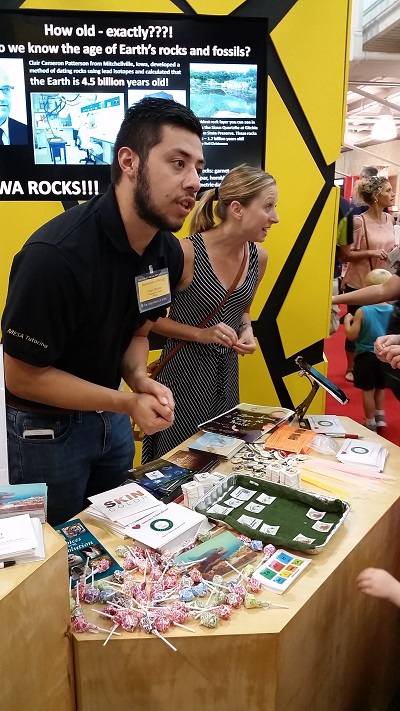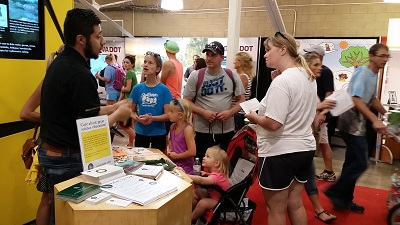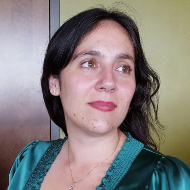“You can’t do outreach on evolution and climate change here. Those topics are too hot to handle.” That’s what I heard over and over again when I started organizing a Science Booster Club in Iowa City last year. My goal—to provide a way for communities to promote science education and support their local science teachers—seemed uncontroversial. Sure, I thought, some people might get their hackles up about evolution and climate change, but lots of potential partners—schools, museums, university professors, for example—would be thrilled to see a grassroots show of support for quality science education on these crucial topics.
My experiences on the ground demonstrate that these fears are at best exaggerated and possibly groundless. The success of our Science Booster Clubs in many communities in Iowa, including rural, conservative, and highly religious communities, shows not only that there is a huge demand for informal, community-based science activities, but that evolution and climate change can be presented in ways that are met with enthusiasm and curiosity, not hostility and controversy. The Iowa City Science Booster Club held its first community outreach program in May of 2015, and we are already on track to have provided a hands-on experience with evolution or climate science to over 80,000 people in fun, accessible community settings.
This August we interacted with thousands of people on the topic of evolution at the Iowa State Fair. The response from people who visited our exhibit was overwhelmingly positive. There was often a line of people waiting to engage with us. Our exhibit illustrated four periods in Iowa’s geologic history, and had beautiful, real Iowan fossils from these periods; treasures people could see and touch to learn how the land and life upon it has changed over time. We also gave out information to help people bring these upbeat, friendly programs to their communities.
Talking to people at our exhibit gave us a chance to learn what people do and don’t know. For example, our intern outreach manager Kyle McElroy writes:
“Fairgoers readily engaged with our booth and were generally surprised to hear that Iowa was once under an ocean. Fossils also tend to bring out stories. People enjoy recounting the time they found an interesting fossil on their land.”
While adult literacy about the region’s basic geological history was low, we found that did not mean people weren’t interested to learn more. And people were eager for ways to connect evolution and concepts of geologic time to their own lives; to find ways to tell stories, to build connections, and to discover personal relevance. Our focus on human connections paid off. The energy at the booth was incredible. As intern Laura Bankers, who had to be gently persuaded to leave the booth after refusing a break for three shifts, writes:
“Taking part in our 'evolution of Iowa' exhibit at the Iowa state fair was an exhilarating experience. Our booth was always busy and we had overwhelmingly positive responses from all of the people we had the opportunity to interact with. I felt like we were able to meaningfully impact a ton of people and were really able to get the word out about the science booster clubs.”

Lest you think that opposition to evolution and climate change education is non-existent, be assured that I am not so naive. At the Iowa State Fair, our science booth was in the same exhibition hall as a large, lavish booth funded by the creationist organization, Answers in Genesis, complete with an enormous mural depicting giraffes and sauropods grazing together, while pterodactyls and pelicans soared overhead in a rainbow-filled sky. Very impressive. But thinly attended. The crowds around both booths made it clear what people wanted to see. Average, everyday people in Iowa want to learn about science. They want to learn about their state’s incredible geologic and evolutionary history. They want their kids to learn about it, too.
At the Iowa State Fair, I learned that there is a real appetite for more than fried food amongst the residents of the heartland. People want access to knowledge and are hungry for ways to bring that knowledge to their communities. As we work to expand our network in Iowa, we’ll do our best to bring communities the tools they need to stand up for science education.


